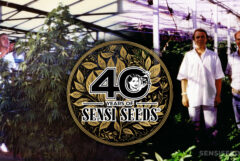Medicinal cannabis is legal in Florida, but recreational cannabis, at present, is not. Various representatives have attempted to pass bills to make cannabis use legal, but so far, they have been met with opposition. As such, the penalties for possessing or selling the drug remain severe, with prison sentences in place for even minor offences.
- CBD Products
- Legal
- Recreational cannabis
- Illegal
- Medicinal cannabis
- Legal since 2016
- Cannabis laws in Florida
- Can you possess and use cannabis in Florida?
- Can you sell cannabis in Florida?
- Can you grow cannabis in Florida?
- Is CBD legal in Florida?
- Medicinal cannabis in Florida
- Industrial hemp in Florida
- Good to know
- Cannabis history
- Attitudes towards cannabis
- Will it be legalised in the future?
Cannabis laws in Florida
The US is governed by federal and state laws. This article covers the cannabis laws in the state of Florida.
Can you possess and use cannabis in Florida?
At present, it’s illegal to possess and use cannabis in Florida. If caught with 20 grams or under, the offender may be given a prison sentence of up to a year, and/or a $1,000 fine. If the amount of cannabis is over 20 grams, the offence becomes a felony, rather than a misdemeanour, and the prison sentence rises to as long as five years (with a possible fine of $5,000).
However, attempts are being made to make recreational cannabis use legal, as it is in some other US states. In 2019, state representatives Carlos Guillermo Smith and Michael Grieco filed a bill, seeking to legalise the drug. This wasn’t given a hearing or a vote. Their bill proposed to permit adults over the age of 21 to “use, possess, and transport” up to 2.5 ounces of cannabis, and grow up to six plants.
One significant obstacle stands in the way of recreational cannabis being legalised, and that’s the restriction of citizen drives. Pushed by Republican representatives, the bill limits the impact citizen petitions can have on constitutional amendments. Given that four of the amendments involve changing current cannabis law, this is likely to be a major issue in the future.
Governor Ron DeSantis signed this controversial bill in June 2019, and it came into immediate effect. The South Florida Sun-Sentinel referred to the move as an “arrogant abuse of political power.”
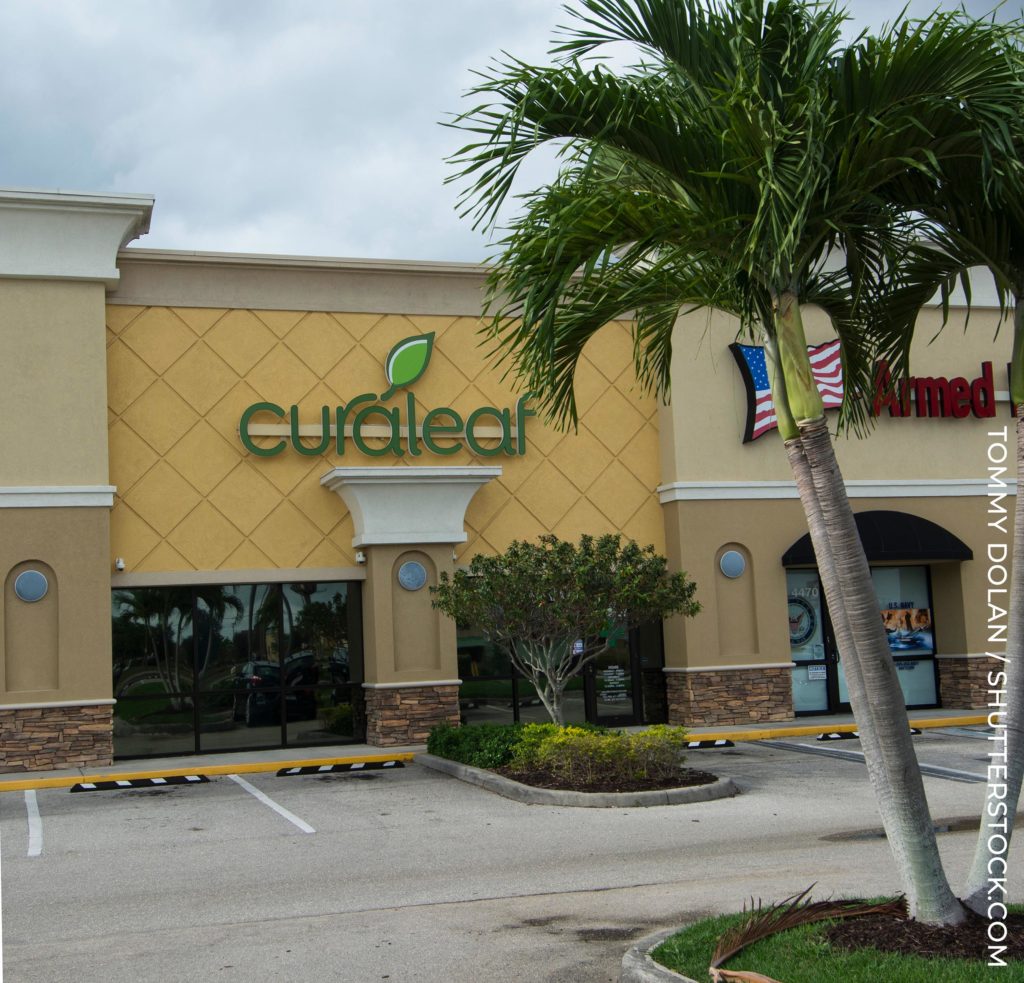
Can you sell cannabis in Florida?
Selling cannabis is also illegal in Florida. If the offender is caught trying to sell 20 grams or less, then the maximum prison sentence is one year, with a $1,000 fine. Selling 25 lb or less is a felony, and can result in up to five years in prison, plus a $5,000 fine. Anything over 25 lb but under 2,000 lb is punished with a three to 15-year prison sentence and a fine of $25,000.
If the laws change after the 2020 general election, then selling cannabis may become legal. Regulate Florida are petitioning to not only get recreational cannabis legalised, but also to create a regulated industry, enabling the plant to be sold to the general public.
Can you grow cannabis in Florida?
It’s illegal to grow cannabis in Florida. If caught cultivating less than 25 plants, the maximum prison sentence is five years (with a $5,000 fine). For 25 to 300 plants, the sentence is increased to a maximum of 15 years and a fine of $10,000; and if the amount of plants is between 300 and 2,000, this changes again, to three to 15 years in prison, plus a $25,000 fine.
If the offender is caught growing 2,000 to 10,000 plants, then the prison sentence is seven to 30 years, with a $50,000 fine. Any cultivation that takes place within 1,000 feet of an educational establishment, park or other specified area can result in a 15-year prison sentence and a $10,000 fine.
The law may change in the future, permitting people in Florida to grow a limited number of plants for personal use only, in their homes. However, at the time of writing, the situation hangs in the balance.
Is CBD legal in Florida?
Since Congress removed hemp from their list of illegal drugs, CBD has been technically legal to use, sell, and buy in Florida. It must come from a licenced grower, and it isn’t allowed to contain more than trace levels of THC (the substance responsible for providing a ‘high’).
In real terms, the law is far more complex. The Florida Department of Agriculture’s official stance is that it’s not legal to sell hemp or CBD, but Nikki Fried, the Agriculture Commissioner, is currently attempting to push through legislation to bring state law in line with federal law.
In the interim period while the situation is ambiguous, the authorities have been largely turning a blind eye to consumers purchasing and using CBD. The few crack-downs that have occurred have been involving CBD retailers, not buyers.
Despite the confusion surrounding the legality of CBD, sales have been booming across the state. During the 2020 COVID-19 lockdown, sales rose by around 59%, with people claiming they were using it to cope with depression and anxiety.
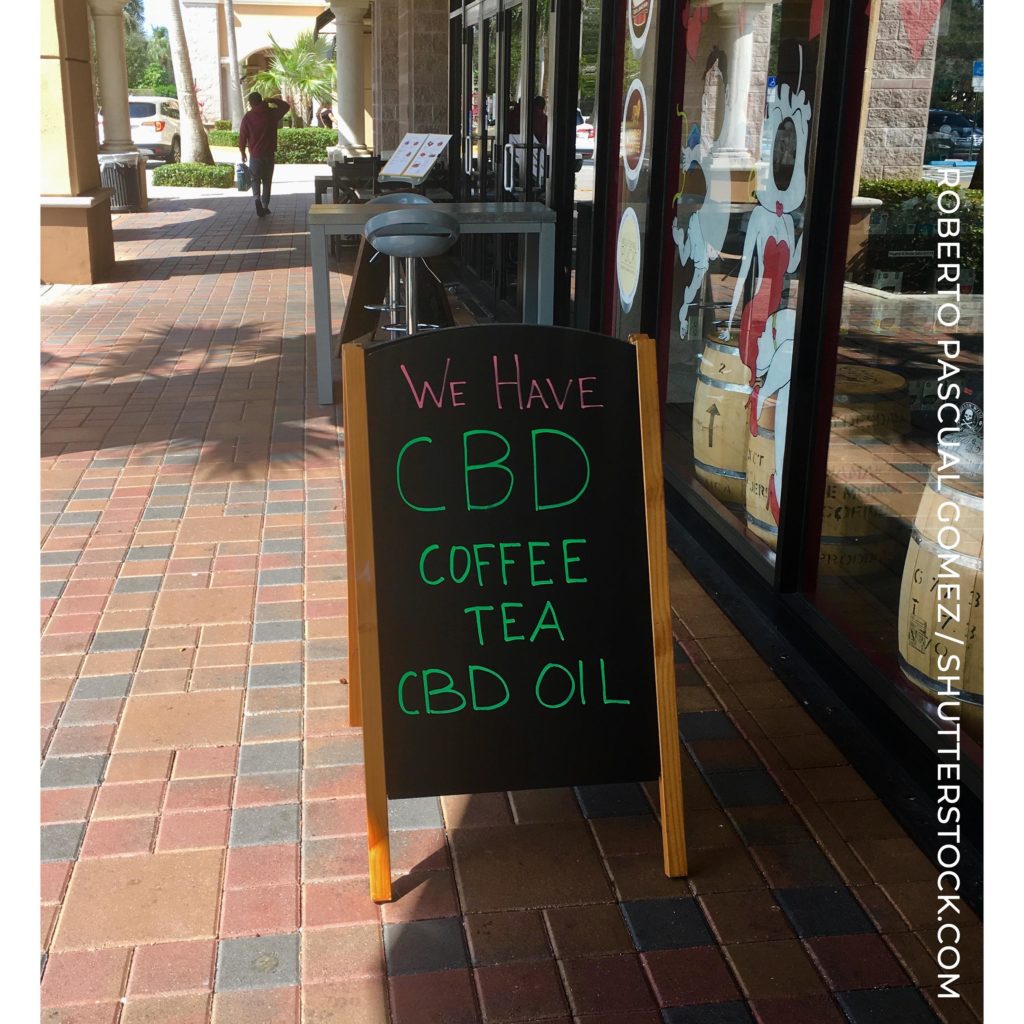
Medicinal cannabis in Florida
Although medicinal cannabis is still illegal at federal level, it was legalised in Florida in 2016. Bill 182 was originally approved by Florida’s Senate in 2014, with a 36 to three vote; and it was put in place to ensure that children with epilepsy had access to medicinal cannabis to treat their condition.
The Senate’s decision was based on the case of a young girl called Charlotte, who was using CBD oil to treat her epilepsy. The bill was nicknamed the ‘Charlotte’s Web bill’ in honour of this girl, and after the high CBD cannabis strain that was named after her too (‘Charlotte’s Web).
In August, 2020, medicinal cannabis edibles were finally legalised, and are now available in dispensaries. Under the current legislation:
- Edibles cannot have bright colours, or resemble any commercial candy to minimize attraction to children.
- They cannot be decorated with sprinkles, icing or any topping.
- Edibles must be packaged appropriately, and can come in the form of lozenges, candy, baked goods, chocolates and drink powders.
- Tetrahydrocannabinol (THC) levels must not exceed 10 mg in single servings, or 200 mg in multi-servings.
Possessing cannabis-infused edibles without a valid medicinal card is illegal.
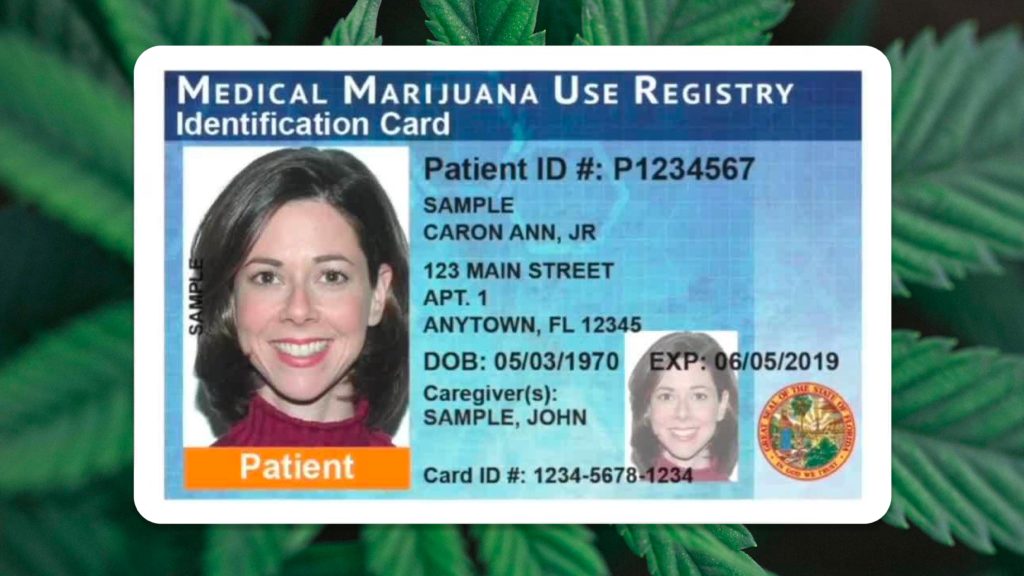
Obtaining medicinal cannabis in Florida
In order to have access to medicinal cannabis, patients must:
- have a Medical Marijuana Use Registry ID card, which permits them to buy and possess medicinal cannabis.
- have a qualifying condition.
- be a permanent or seasonal resident of the state.
- agree to keep the medicinal cannabis in Florida – it can’t legally be taken across the border.
- agree to use it privately – public use is forbidden.
- store it out of reach of children, ideally in a locked box.
How to qualify for an ID card
In order to qualify for medicinal cannabis, the patient must first be diagnosed by a qualified physician. If the patient is under 18, a second physician needs to agree with the original diagnosis.
Once approved, the patient is then entered into the Medical Marijuana Use Registry (and their caregiver, if applicable). They can then apply for an ID card, and obtain cannabis products at any approved Medical Marijuana Treatment Centre. Alternatively, they can have the products delivered to their home.
Qualifying conditions
The following health conditions have been approved for medicinal cannabis treatment in Florida:
- Cancer
- Epilepsy
- HIV/AIDS
- Glaucoma
- Multiple Sclerosis
- Crohn’s Disease
- Post-Traumatic Stress Disorder
- Amyotrophic Lateral Sclerosis
- Any conditions that are comparable to those listed above
- Any terminal conditions
- Chronic non-malignant pain
Industrial hemp in Florida
Industrial hemp was legalised at federal level in 2018, under the Farm Bill. In 2019, Florida’s Senate voted unanimously to pass a bill, establishing a framework for the regulation of hemp cultivation in the state.
If approved, the bill directs Florida’s Department of Agriculture to start drafting the rules for the state’s hemp industry, with regards to safety standards, licencing, and quality control. An advisory council will also be created, providing education to local communities, and explaining how hemp differs from cannabis.
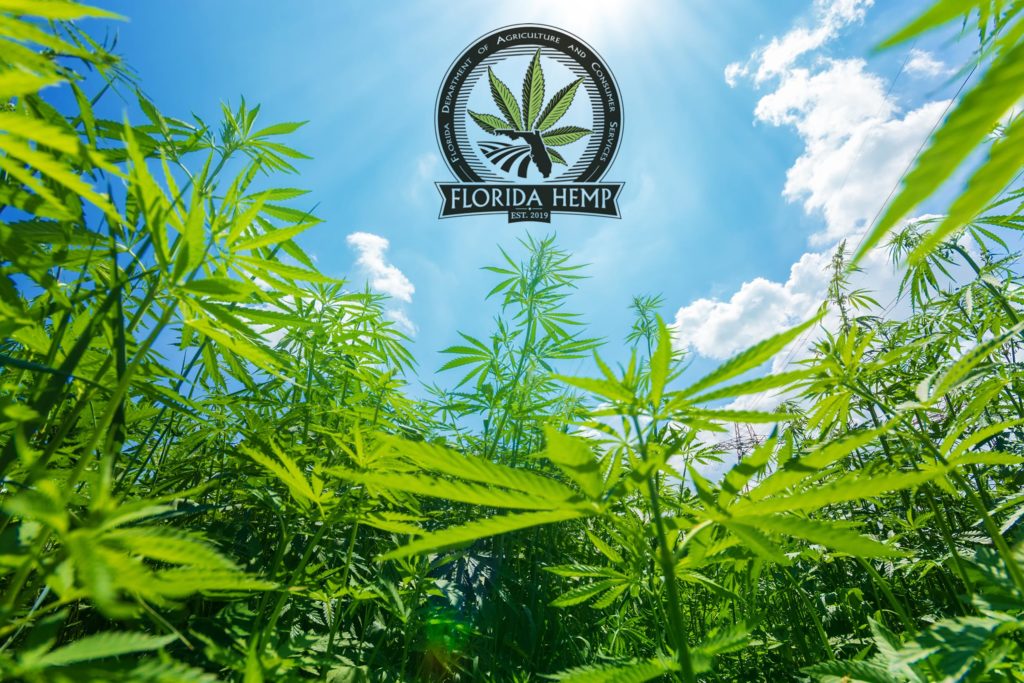
Good to know
If you are travelling to Florida (or currently live there), you may be interested to know the following:
- Although the authorities are adopting a relaxed approach to CBD at present, there have been clamp-downs on certain products. For example, in 2019, $33,000 worth of CBD edibles were seized, as they looked too much like children’s sweets.
- In 2019, the Florida Board of Medicine officially approved the prescribing of smokeable medicinal cannabis.
- The famous OG Kush strain was first cultivated in Florida, after a California strain was paired with Hindu Kush from Amsterdam.
Cannabis history
It took a long time for cannabis to make its way to Florida. Elsewhere in the country, the plant’s popularity grew significantly during the prohibition period (the 1920s), but Florida took a little while longer to fully embrace it.
However, by 1931, the Key West Citizen commented that: “use of marijuana, a drug made from a Mexican plant, is rapidly spreading in the United States. And, the pity of it is, there is little legislation to prevent this.”
At this time in the US, notable public figures and businessmen were promoting negativity towards the plant. Harry J. Anslinger, the first commissioner of the US Bureau of Narcotics, launched a smear campaign, blaming cannabis for several violent offences in the country. These cases of cannabis-inflicted crime were later debunked by historians.
The Marihuana Tax Act of 1937 saw the plant banned in Florida, along with the rest of the country. Although public perception was largely negative throughout the 1940s, by the 1950s and 60s, hippy culture had taken root – and cannabis was taken up by Florida’s hip young citizens.
In fact, Florida was one of the first to embrace cannabis. The Miami Pop Festival (which was held a year before Woodstock) was full of people smoking it, along with performances by Fleetwood Mac, Joni Mitchell, and Jimi Hendrix.
By the end of the 1960s, Florida was known as the US’s cannabis smuggling capital, with the drug regularly entering the ports. This continued throughout the following decade, though as well as gaining a reputation for trafficking the drug, the state was also renowned for growing it too.
Ronald Reagan’s War on Drugs in the 80s meant that Florida’s cannabis fields were covered in chemicals, as part of the eradication efforts. The drugs cartels weren’t too worried about selling cannabis covered in toxic substances, which resulted in users getting sick. In 1988, the Miami Herald stated that the plant was the second biggest crop in Florida, bringing in around $400 million each year.
By the 1990s, attitudes were changing once more. In 1991, Kenneth and Barbara Jenks were arrested for using cannabis to treat their AIDS symptoms. They appealed their conviction and were later acquitted. This, and other similar cases, eventually led to medicinal cannabis being legalised – though it took over 20 years for it to happen.
Attitudes towards cannabis
The legalisation of medicinal cannabis demonstrates how attitudes towards the drug have changed in Florida. When the Medical Marijuana Legalisation Initiative was put to the vote, 71% of the state’s citizens approved it – a considerable majority.
There is still some opposition to its use; notably from Republican representatives. However, it seems that the public are largely open to the legalisation of the drug.
Will it be legalised in the future?
Various attempts have been made to legalise recreational cannabis use in Florida. So far, none have been successful – but experts suggest that it’s only a matter of time before the legislation is passed.
- Disclaimer:While every effort has been made to ensure the accuracy of this article, it is not intended to provide legal advice, as individual situations will differ and should be discussed with an expert and/or lawyer.







